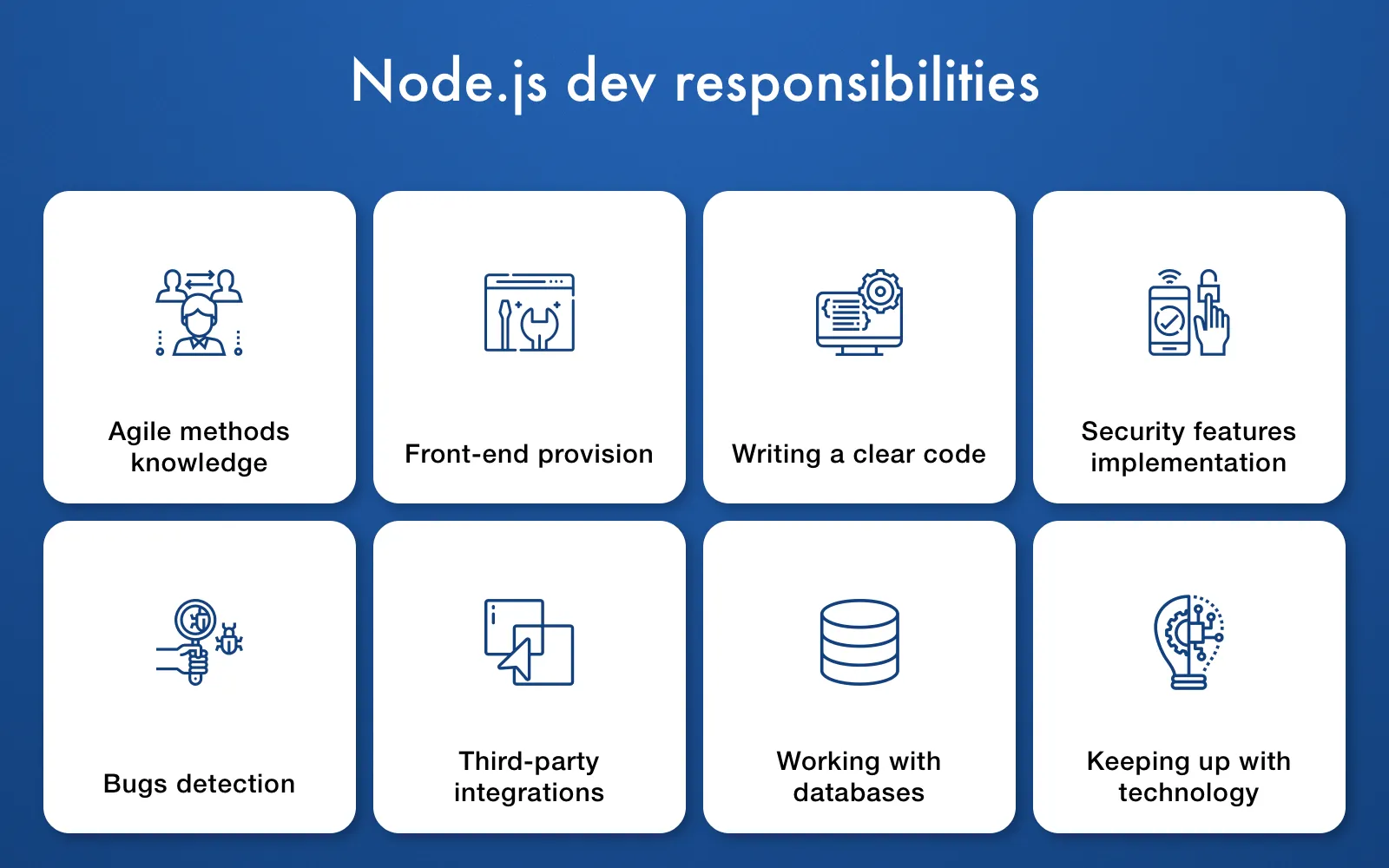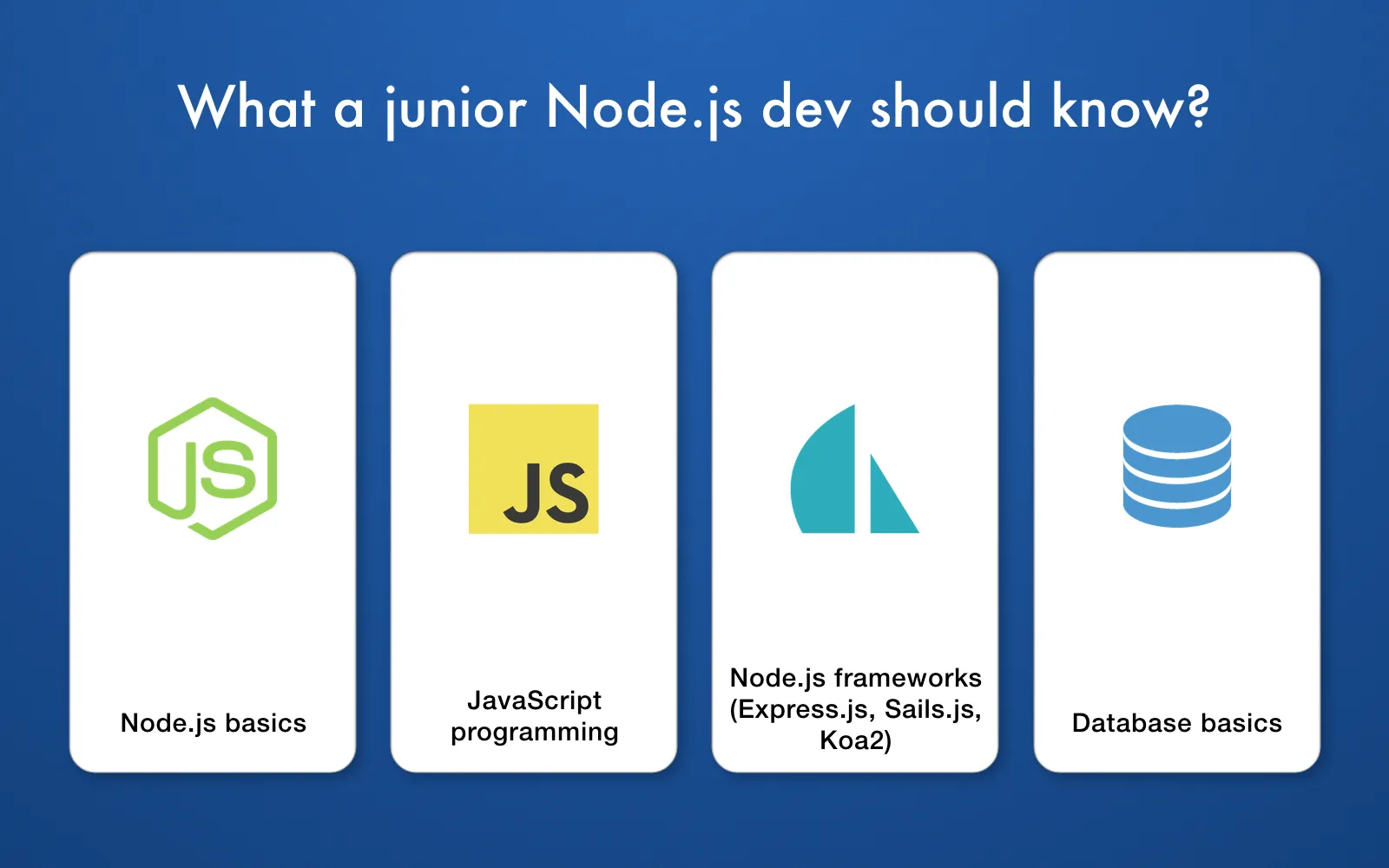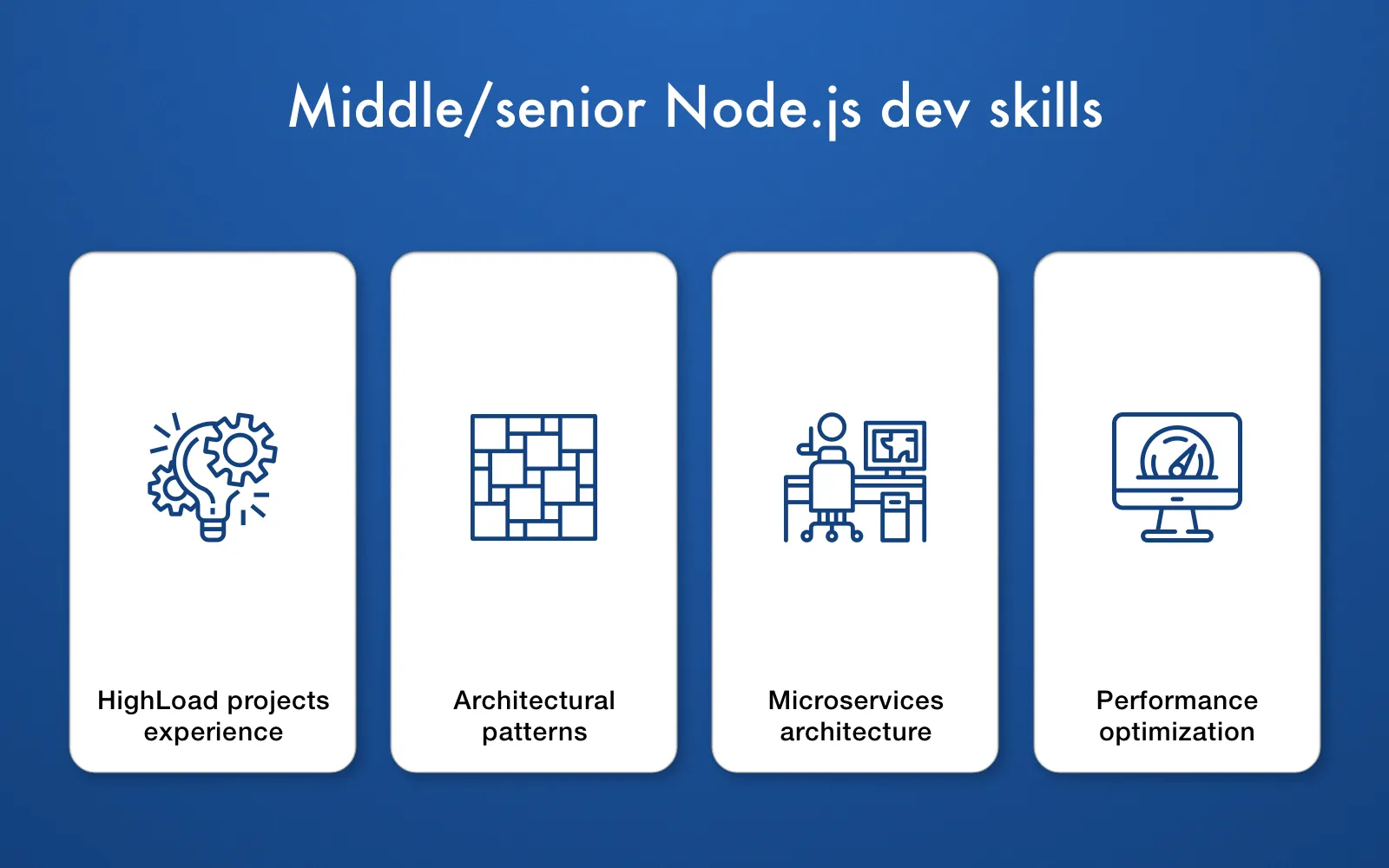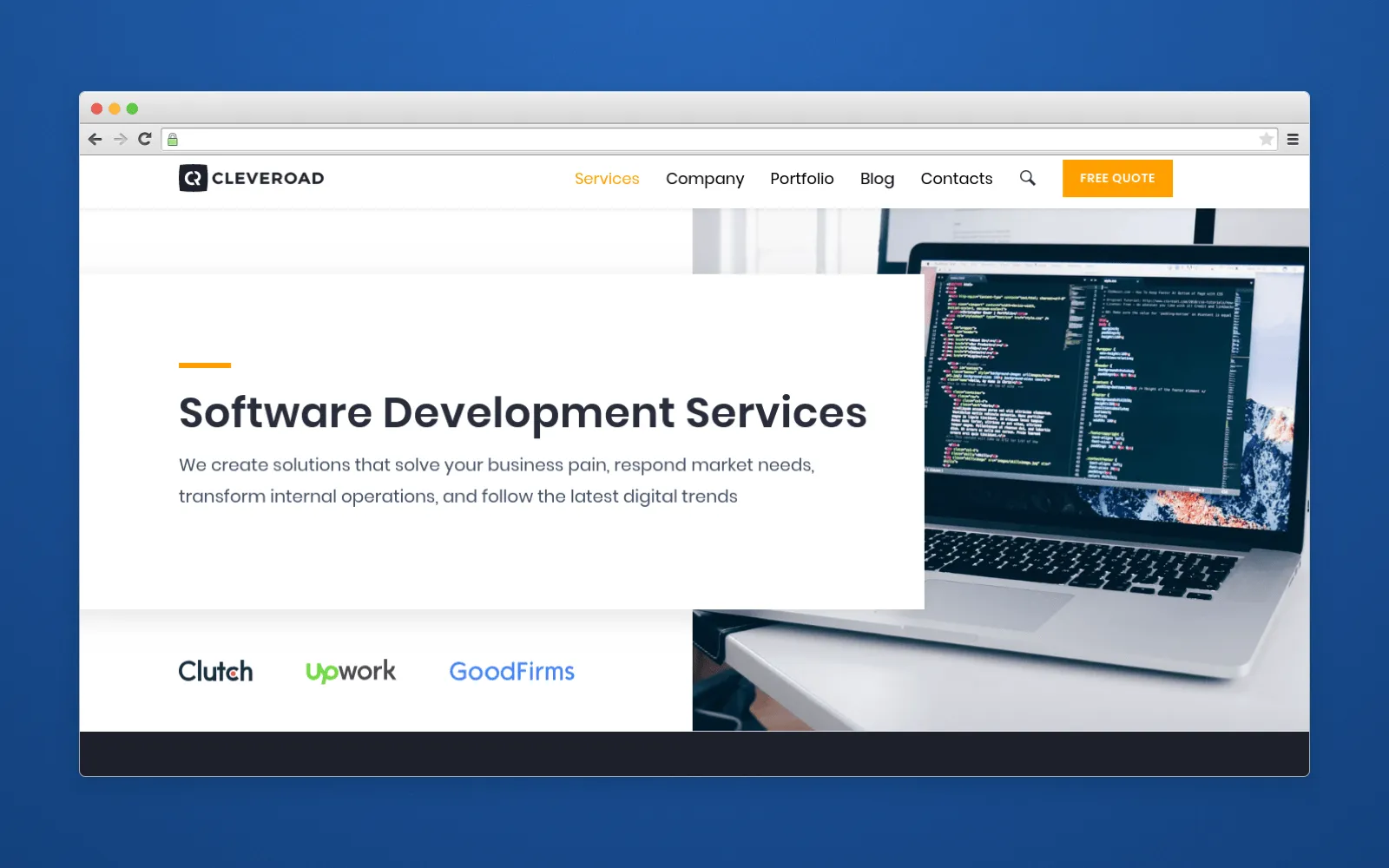How to Hire Node.js Developers: Skills, Salaries, and Interview Questions
Updated 18 Mar 2023
14 Min
3974 Views
A website or application without back-end development can be compared to a new car without an engine – looks beautiful yet won’t start. No wonder developers use each and every tool that helps them create applications that run seamlessly and please their users.
In this article, we’re going to stop on popular and widely used back-end development platform — Node.js . Here you will find all the details regarding Node.js developer responsibilities, skills, hourly rates, and other information you may find useful. Additionally, we’ve listed hiring options and Node.js interview questions to enrich this article and make it as useful as it can be.
Node.js Developer Roles and Responsibilities
First of all, let’s take a look at the main roles of NodeJS developers and find out what they are usually responsible for.
Roles of Node.js Developers
The primary focus of Node.js specialist remains the management of data interchange between users and the server. Besides, developers work on such issues as creating logic behind applications, establishing close to perfect performance and making sure that user requests are thoroughly processed by the system.
Node.js development services include both front-end and back-end. So even if you’re going to hire a back-end developer proficient with Node.js, they should have a basic understanding of the user-facing part of application and be ready to work with front-end elements created by their colleagues.
Additionally, as third-party tools are used during any app development, Node.js roles include integration various tools into applications.
Node.js Developers Responsibilities
Software developers always have a wide range of responsibilities and Node.js devs are no different.
This way, tasks Node.js specialists are responsible for include:
- Adhering to Agile methods
- Clear code writing
- Front-end development
- Security implementation
- Detecting performance issues
- APIs integration
- Database configuration
- Staying up-to-date

Main responsibilities of Node.js developers
Now let’s review the aforementioned responsibilities in details.
Working with Agile methods
Agile approach is widely used in IT sphere today due to its democratic ways of handling the development. Therefore, Node.js developers should be familiar with Agile development methods to follow them during product development. The methodology helps to organize planning, design, and testing during the development lifecycle which greatly simplifies the whole process.
Front-end provision
Although Node.js is considered to be a back-end technology, front-end developers deal with it pretty often. Moreover, it’s hard to imagine a project created without Node.js tools. The platform is used for NPM scripts, creating Gulp tasks, web pack configuration, etc. By the way, full stack Node.js developer rates is usually higher than the pay of back-end specialists.
If you're looking for a front-end developer to join your team, read our detailed guide How to hire front-end developers in 2024
Writing a clear code
Creating an understandable code is what defines seniors among junior Node.js developers. The code written by a professional is reusable, laconic and easy-readable. Additionally, senior developers have a good practice of object-oriented programming, DRY (Don’t Repeat Yourself) principles, know main design patterns and are willing to follow the uniform code format. By using these means, the developer will greatly help their colleagues to understand what is actually going on and prevent important parts of the code from being removed.
Working on security features
Security these days is the top priority and thus something you don’t want developers to overlook. There are quite a few security options Node.js developers should be aware of, for example, HTTP response adjustment, limiting concurrent requests, avoiding module loading, etc. In addition, developers have to pay special attention to sensitive data such as payment details and be familiar with GDPR terms. All that will help developers to secure the product and reduce the number of hacking attempts, negating their results.
Bugs detection
We’ve already mentioned that writing clear code is extremely important, and here’s another explanation why. After the job of Node.js developer is done, QA team performs a thorough check, detecting bugs and other imperfections. Thus, if any issue appears during the testing process, developers should fix it in a timely fashion, no matter if the code was written by them or another dev team. In addition, Node.js specialists run autotests during test-driven and behavior-driven development processes as well as perform unit testing.
Third-party services integration
Complex applications or websites rarely run without any third-party services, for instance, payment systems like PayPal, Stripe or Braintree. Node.js is great for payment gateway integration as it allows to simplify the process due to the number of already made modules created by other developers. Modules reduce development time and, respectively, its cost. This is beneficial for both devs and product owners – after all, the main goal of Node.js dev hire is finding a person that can make a website or application run properly with minimum code lines.
Working with databases
If you’re going to deliver personalized content it’s necessary to store the data somewhere. By using Node.js in combination with databases, developers configure data storing process in applications. Usually, databases have drivers for Node.js and libraries in NPM which speeds the configuration process up. The most popular database management system for Node.js is MongoDB which allows working with the database, receive and add data to it.
Keeping up with technology
Node.js updates are being actively developed and released a few times a year. Thus, the development team should be ready to switch to the latest version with a lot of improvements, security updates, and new features. By the way, as Node.js platform is used for both front-end and back-end development, it’s vital for the specialist to get acquainted with other Node.js developer tools.
Node.js Developer Skills
As always, in order to fill the position, a potential Node.js developer should have specific skills and be competent in the field. According to the skills, we can define three levels of developers: junior, middle and senior.
Some product owners may want to hire senior Node.js developers in order to make sure that their projects are in good hands. Still, in some cases, middle devs may show the same good results. So let’s take a look at the main skills of Node.js specialists by levels to find out which one suits you best.
undefined
Skills of a junior Node.js developer include:
- Understanding of Node.js basics (Event Loop, libuv, asynchronous programming, etc.)
- JavaScript knowledge
- Knowledge of popular Node.js frameworks (Express.js)
- Database basics (relational or non-relational databases)

Skills of junior Node.js developers
undefined
As for middle/senior experts, they should be proficient with:
- HighLoad projects experience
- Architectural patterns
- Microservices architecture
- Performance optimization

Skills of middle/senor Node.js developers
undefined
Finally, we would also like to mention the required soft skills:
- Active learning
- Commitment
- Engineering thinking
- Analytical ability
- Ability to work as part of the team
- Decent knowledge of English
You can also check more details on candidates’ soft skills testing in the next part of the article.
undefined
Also, please note that the skills we mentioned refer exactly to Node.js developers. However, there are some competencies all software engineers should be proficient in. Thus, a qualified software engineer should have a decent knowledge of object-oriented programming and design, algorithms, encryption basics, know and follow code style standards.
undefined
Node.js Developer Interview Questions
undefined
undefined
If you’re going to hire devs for your project, you must be also interested in testing their qualification and skills. We’re prepared a bunch of technical questions related to Node.js platform and you’re most welcome to use them for interviewing potential candidates.
Interested in hiring Node.js developers? Let us know and we will provide you with CVs of our best Node.js specialists.
Hard Skills Questions
undefined
Node.js skills, therefore, is the first thing employers pay attention to as they define the professional level of the candidate. We list some of the questions every qualified Node.js developer should know the answer to.
- What is NPM?
- What is Closures?
- Explain Modules in Node.js
- Explain V8 Engine
- Explain event loop in Node.js
- Explain what is libuv in Node.js
- Why Node.js is single threaded?
- Since Node.js is a single threaded process, how to make use of all CPUs?
- What is a cluster?
- What are event emitters in Node.js?
- Explain the difference between readFile and createReadStream in Node.js
- Provide the steps for setting up an Express.js application
- How can you use middleware in Express?
- Explain the difference between process nextTick() and setImmediate()
undefined
You can read detailed answers to these questions in the PDF file attached below.
At Cleveroad you can find a range of experienced Node.js developers that will be glad to help you with interviewing process. Drop us a line and we will contact your back!
Soft Skills Questions
undefined
Soft skills are often as important as the professional level of a candidate, especially when you are going to hire Node.js developer for a long-time project. That’s the reason communication skills, stress tolerance, teamwork and conflict management are usually checked during the interview by HR managers or Team Leaders.
For experienced employers, an hour-long talk may be enough to form a view of the person. However, if you don’t have a chance to talk to the candidate personally, feel free to use the list of soft skills interview questions attached in the PDF file.
undefined
Hiring Options
When it comes to custom web app development company choosing, there are three popular hiring options on the IT market. To hire the best specialists you should rather prepare a list of your requirements and find out what option matches it most.
So, do freelancers with a decent knowledge of Node.js and hourly rate you can afford are the best? Are you considering in-house employees? Or, maybe, interested in outsourcing software developers? Let’s review all three in details to find out.
Freelancers
Hiring a freelancer often seems to be the most attractive option with a number of resources to look through. However, there always is a catch. Freelancers work for themselves and may indeed be experienced specialists with a number of projects under the belt, good rates, and nice reviews. Still, you cannot know for sure that all the information provided is valid. We suggest considering this option only in case you need to make some minor changes in a website or app, or someone to work on a simple short-term project.
Take a minute to check our detailed estimation of how much does it cost to develop a website in 2024
By the way, it’s definitely worth paying attention to the fact that you cannot hire one Node.js developer for delivering a feature-rich product from scratch. Most probably, you will also need a team of front-end devs, QA testers, designers, etc. It may be extremely hard to remotely cooperate with a full team.
undefined
Pros
- Cheap
- Wide range of specialists
Cons
- Deadlines may not be met
- Developers may disappear anytime
- No contract signed
- Possible language barrier
- Different time zones
- Management complexity
undefined
In case you’re sure that freelance developer is exactly what you need, we suggest using the following resources to hire one:
undefined
undefined

Freelance hiring website (UpWorks)
In-house developers
In-house specialists will be working from your office and, prior to that, should ace the interview. Office employees are great for delivering a specific project you put high stakes at – that means providing full support, maintenance, and updates when required. This approach allows you to control each and every member of the team, monitor their performance and assign specific tasks to certain people.
Although in-house approach is what we see in everyday life, it’s considered to be the most expensive option due to monthly wages, rent payment, a working place you have to deliver as well as many other expected or unexpected costs.
Pros
- Developers can be accessed anytime
- Effective collaboration
- Full control of the development process
- Same schedule, no communication issues
- Great for long-term projects
Cons
- Undergoing the interviewing process
- Monthly wages regardless of the actual contribution
- Additional expenses: sick leaves, vacations, paid days off
- Office rent and taxes
- Software and hardware expenses
undefined
In case in-house option works for you, we suggest checking such resources as:
Outsourcing companies
The last but not least option is working with an outsourcing team of Node.js developers from another country. This approach works for both small and large projects with any budget as the total cost is usually much lower than Node.js development done by of in-house employees.
Outsourcing teams are qualified and have all the required software and hardware – all they need is a thorough description of your project and your willingness to cooperate.
In addition, if you need just one Node.js specialist for completing a task, you can always hire them from the company and not to worry about failed deadlines or no documentation signed. Most outsourcing companies sign contracts and watch over their reputation by monitoring customers’ feedback.
undefined

Outsourcing company website (Cleveroad)
undefined
Pros
- Reduced production cost
- No additional expenses you have to bear
- Each aspect can be discussed with the product manager
- General team experience and quality work
Cons
- Possible language barrier and different time zones
undefined
However, the cons of working with outsourcing developers are easy to manage. Companies often assign dedicated team managers proficient in English to projects to establish the cooperation process, and they are available almost anytime.
undefined
Check more details on freelancer and company teams, their pros and cons in our Freelancer vs Software Development Firm guide
Where can you hire an outsourcing team? We suggest checking such resources as Clutch or Good Firms. They provide a list of trustworthy companies, including their customers’ reviews and rates.
Drawing the line, we’d like to mention that it’s better to start the hiring process from identifying your project requirements, define the target audience and, of course, understand what MPV features should be implemented.
Node.js Developer Hourly Rate
As we’re already aware of the hiring options, it’s high time to plan the budget. We provide a rough estimation of hourly rates and salary for Node.js developers to help you choose the right approach.
In addition, it’s worth noting that outsourcing companies and freelancers work with hourly rates while in-house devs prefer monthly wages. That’s why we’re providing hourly Node.js development prices for freelancers as well as outsourcing companies and annually pay for in-house employees.
undefined
Let’s start with freelance developers hourly rates (according to Codementor platform).
| Region | Hourly Rate, $ (junior) | Hourly Rate, $ (middle/senior) |
North America | 41-60 | 80-120 |
Western Europe | 61-80 | 81-100 |
Australia | 61-80 | 81-100 |
Eastern Europe | 41-60 | 41-80 |
Asia | 41-60 | 61-80 |
India | 15-25 | 15-25 |
undefined
Hourly rates of outsourcing companies may differ so take a minute to check the following estimation based on GoodFirms and Clutch research.
| Region | Hourly Rate ($) |
North America | 120-180 |
Australia | 100-180 |
Western Europe | 51-100 |
Asia | 30-42 |
Eastern Europe | 25-50 |
India | 18-40 |
Finally, we’d like to mention the annual pay of in-house devs. So here comes the rough estimation of average Node.js developer salary in different regions according to PayScale.
| Region | Annual salary ($) |
North America | 74,081 |
Western Europe | 51,551 |
Eastern Europe | 24,200 |
Australia | 90,000 |
Asia | 48,948 |
India | 20,000 |
How We Use Node.js at Cleveroad
At Cleveroad we have a number of experts proficient in back-end development that use Node.js platform in particular.
First of all, Node.js is usually used for real-time application development. For instance, Uber-like apps, chats, and other projects that imply real-time updates.
Unveil how to make an app like Uber and how much does it cost
Secondly, as we mentioned, Node technology is great for third-party services integration and that’s what our teams take advantage of. Due to the capabilities the platform provides, we create products that imply restful API usage.
Finally, as Cleveroad devs work on various projects that require database management, they can simplify the process with the help of Node.js.
You’re welcome to check some of the projects we’ve developed using Node.js.
LetsSurf
- General idea: Those who'd like to learn surfing can now easily find instructions on the LetsSurf platform and get down to business right away.
- Dev team: 2 back-end developers, 2 front-end developers
- Development time: 2,5 months
- Technology used: Node.js, Angular 5, Express 4, MySQL, Sequelize
TrainAway
- General idea: TrainAway, due to its expanded database (more than 130.000 gyms added), helps with finding a nearby gym no matter if you're on a business trip or vacation.
- Dev team: 2 back-end developers, 2 front-end developers
- Development time: 8 months
- Technology used: Node.js, Angular.js, MySQL
Wrapping Up
In conclusion, we’d like to mention that before contacting developers with an intention to hire them, it’s always better to check and double-check their skills, define your requirements, find out if Node.js developers’ hourly rates are affordable for you and many other important aspects we’ve covered. If you have any question regarding the topic we didn’t include in our hiring guide, feel free to contact us.
Looking for Node.js devs?
Our back-end experts will gladly join your team or help with tech interview!
Node.js programmers are responsible for back-end development:
- They manage the data interchange between users and a server
- Create logic behind applications,
- Establish the close-to-perfect performance of the app
- Make sure that user requests are thoroughly processed by the system
Node.js developers work with both front-end and back-end, though the focus is on user-server interactions (back-end development).
Node.js programmers create logic behind applications, establish close to perfect performance, and ensure that user requests are thoroughly processed by the system.
Junior Node.js developer:
- Understands Node.js basics (Event Loop, libuv, asynchronous programming, etc.)
- Knows JavaScript
- Knows popular Node.js frameworks (like Express.js)
- Understands database basics (relational or non-relational databases)
Middle/senior-level Node.js developer:
- Has experience with HighLoad projects
- Knows architectural patterns
- Microservices architecture
- Performance optimization
Here are some of the questions every Node.js developer should know the answer to:
- What is NPM?
- What is Closures?
- Explain Modules in Node.js
- Explain V8 Engine
- Explain event loop in Node.js
- Explain what is libuv in Node.js
- Why is Node.js single-threaded?
- Since Node.js is a single-threaded process, how to make use of all CPUs?
- What is a cluster?
Check the full list with answers here
Depends on their qualification and the region they're from.
In the USA, freelancers get from $41-$60/h (junior-level) to $80-$120 (middle/senior), and more.
In Eastern Europe, a popular outsourcing region, the prices are lower -- $41-$80 per hour. Outsourcing companies in the same region charge $25-$50 per hour.

Evgeniy Altynpara is a CTO and member of the Forbes Councils’ community of tech professionals. He is an expert in software development and technological entrepreneurship and has 10+years of experience in digital transformation consulting in Healthcare, FinTech, Supply Chain and Logistics
Give us your impressions about this article
Give us your impressions about this article
Comments
1 commentsThe currently stunning technology is NodeJS ..the best one i can tell

